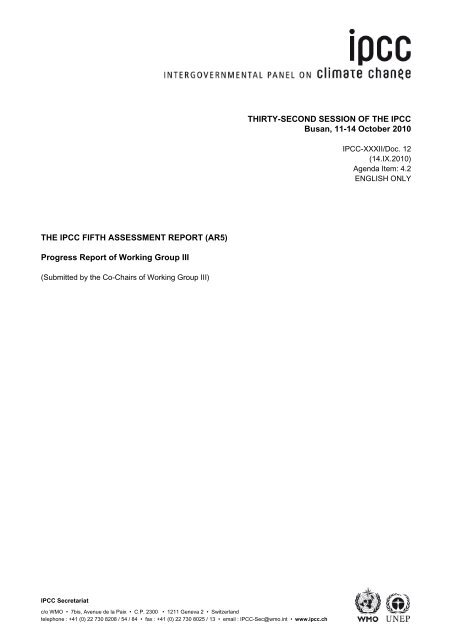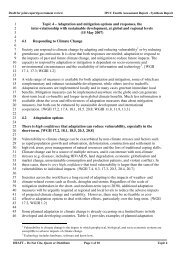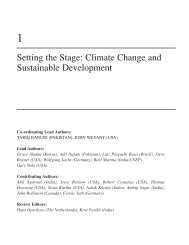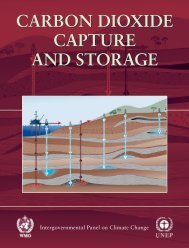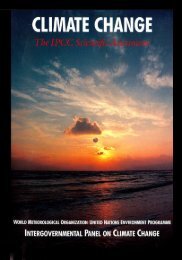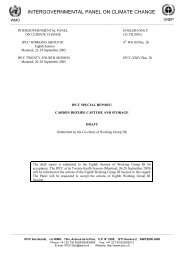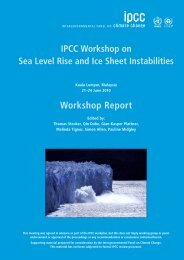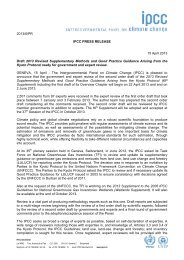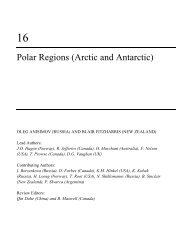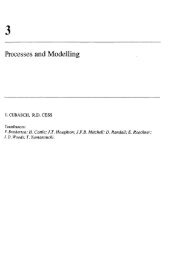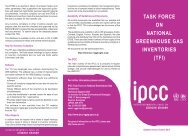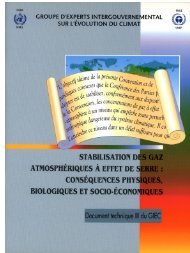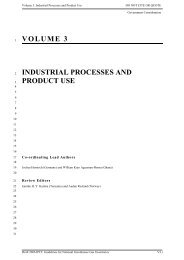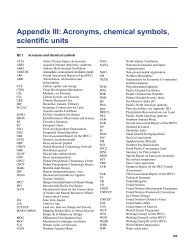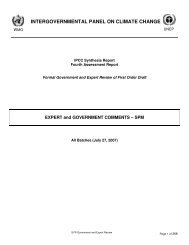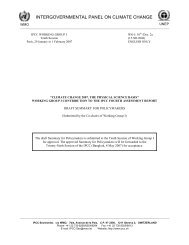IPCC-XXXII/Doc. 12
IPCC-XXXII/Doc. 12
IPCC-XXXII/Doc. 12
Create successful ePaper yourself
Turn your PDF publications into a flip-book with our unique Google optimized e-Paper software.
THIRTY-SECOND SESSION OF THE <strong>IPCC</strong><br />
Busan, 11-14 October 2010<br />
<strong>IPCC</strong>-<strong>XXXII</strong>/<strong>Doc</strong>. <strong>12</strong><br />
(14.IX.2010)<br />
Agenda Item: 4.2<br />
ENGLISH ONLY<br />
THE <strong>IPCC</strong> FIFTH ASSESSMENT REPORT (AR5)<br />
Progress Report of Working Group III<br />
(Submitted by the Co-Chairs of Working Group III)<br />
<strong>IPCC</strong> Secretariat<br />
c/o WMO • 7bis, Avenue de la Paix • C.P. 2300 • <strong>12</strong>11 Geneva 2 • Switzerland<br />
telephone : +41 (0) 22 730 8208 / 54 / 84 • fax : +41 (0) 22 730 8025 / 13 • email : <strong>IPCC</strong>-Sec@wmo.int • www.ipcc.ch
PROGRESS REPORT OF WORKING GROUP III<br />
FIFTH ASSESSMENT REPORT (AR5)<br />
(Submitted by the Co-Chairs of Working Group III)<br />
1. Background<br />
At the 28 th Session of the <strong>IPCC</strong> (<strong>IPCC</strong>-XXVIII, 9-10 April 2008 Budapest), it was decided to carry<br />
out a Fifth Assessment Report to be finalized in 2014. An AR5 scoping meeting was held on 13-17<br />
July 2009 in Venice. The resulting scoping documents of all three Working Groups where sent out<br />
for Government review and comments. The outline of Working Group III was adopted with a few<br />
amendments at the tenth Session of Working Group III (WGIII: 10 th ) and agreed by the 31 st Session<br />
of the <strong>IPCC</strong> (both 26-29 October 2009, Bali) as laid out in WG-III: 10 th /<strong>Doc</strong>.2 rev. / <strong>IPCC</strong>-XXXI/<strong>Doc</strong>.<br />
21. 1 Subsequent to the Plenary Session in Bali, a full nomination process was carried out in<br />
accordance with the <strong>IPCC</strong> Principles and Procedures and the Working Group III Bureau selected<br />
Coordinating Lead Authors, Lead Authors and Review Editors for the report.<br />
2. Milestones since <strong>IPCC</strong>-XXXI (26-29 October 2009, Bali)<br />
2.1 Selection Process of Authors and Review Editors<br />
Nominations for Coordinating Lead Authors (CLA), Lead Authors (LA) and Review Editors (RE) to<br />
contribute to the Fifth Assessment Report (AR5) of Working Group III (WGIII) were submitted by the<br />
<strong>IPCC</strong> focal points by <strong>12</strong> March 2010. The full list of nominations was distributed to the WGIII Bureau<br />
and the CVs of all experts were made accessible via a protected website. All nominations were<br />
reviewed in accordance with the <strong>IPCC</strong> procedures in order to select the expertise required, cover a<br />
range of views, and ensure geographical representation. For the purpose of implementing these<br />
criteria a range of indicators was used for assessing the CVs. This included, for example, whether<br />
candidates had a background in research or industry, the extent and impact of their publications and<br />
relevant affiliations. In addition, information about the primary expertise of candidates, as provided<br />
during the nomination process, was complemented by keywords extracted from the CVs, thus<br />
facilitating an easier allocation to specific chapter sections of the AR5 outline. The information<br />
gathered during this assessment was collated in a database in combination with the author specific<br />
details from the nomination process. Previous <strong>IPCC</strong> experience was also recorded with the aim to<br />
achieve an appropriate mixture of <strong>IPCC</strong>-experienced CLA, LA and RE and those new to the<br />
process, taking into account the crucial difference between the outlines of the Fourth Assessment<br />
Report (AR4) and AR5.<br />
Based on this review, the Co-Chairs created a proposal for a “pool list”, identifying different<br />
candidates for the positions of CLA, LA and RE, which still contained an excess number of<br />
candidates for each chapter. The WGIII Bureau was then asked to comment on and amend the<br />
proposed pool list (i.e. add new names from the full nomination list, add completely new<br />
suggestions or delete existing ones). Based on the consolidated pool list the Co-Chairs then created<br />
a proposal for a “short list” that served as a basis for the final decisions during the WGIII Bureau<br />
Session (17-18 May 2010, Geneva). Over the course of one and a half days of very constructive<br />
discussions, the WGIII Bureau scrutinized the proposed shortlist chapter by chapter. For each<br />
chapter a CLA from a developing country (DC) or from a country with an economy in transition<br />
(EIT), and a CLA from an industrialized country (IC) where selected. LAs where chosen with a view<br />
to cover the necessary expertise, also taking into account regional and gender balance. For the<br />
REs, the same regional composition as for the CLA teams was applied, with Bureau Members<br />
complementing the selected experts where possible. Throughout the selection process, great<br />
emphasis was placed on choosing highly recognised individuals to ensure the necessary level of<br />
excellence that will be required for the upcoming assessment cycle.<br />
1 The outline can be downloaded at http://www.ipcc-wg3.de/.files/WGIII-Outline-AR5.pdf).<br />
<strong>IPCC</strong>-<strong>XXXII</strong>/<strong>Doc</strong>. <strong>12</strong>, p.1
The TSUs of the other WGs were consulted early in the process to discuss and avoid overlaps in<br />
the author slates while following the idea of introducing cross-WG bridge authors. The latter aspect<br />
entails that LAs of one WG are also marked to serve as Contributing Authors (CAs) in another WG<br />
as required. It can be seen as a positive development for improving cross-WG coherence that a<br />
significant number of authors has been nominated and is qualified for participation in more than one<br />
WG.<br />
Based on the agreed author slate, invitations to CLAs, LAs and REs were sent out after the fortyfirst<br />
Bureau Session (BUR-XLI, 19-20 May 2010, Geneva). Unfortunately, a number of regrets were<br />
received and replacements for these experts had to be found. All new authors were selected<br />
according to the expertise that needed to be replaced, taking regional and gender aspects as much<br />
as possible into consideration. At present, there is still one position of a trade expert that remains to<br />
be filled in Chapter 15 on “Regional and Sub-national Policies and Institutions”. In addition, the<br />
WGIII Bureau agreed in Geneva to keep 3 positions vacant in Chapter <strong>12</strong> “Human Settlements,<br />
Infrastructure and Spatial Planning”. These will be filled once the detailed outline of this chapter is<br />
agreed based on the Expert Meeting on “Human Settlements and Infrastructure” which will take<br />
place on 22-24 March 2011 (see table 3 below). The current list of authors is provided as an<br />
information document to this Plenary Session. 2<br />
2.2 Statistics on Nominations and Selected Author Teams<br />
WG III received 1008 Government/Organization nominations for CLA, LA and RE to contribute to<br />
the AR5 of the <strong>IPCC</strong>. In total, experts from 70 different countries were nominated. Table 1 shows<br />
the distribution of official nominations within the six WMO regions 3 .<br />
Table 1 WGIII AR5 official author nominations according to WMO region and region type (DC –<br />
Developing Country, EIT – Countries with Economies in Transition and IC – Industrialised Country).<br />
WMO Region<br />
Absolute<br />
Numbers<br />
Percentage<br />
%<br />
I – Africa 38 4%<br />
II – Asia 237 24%<br />
III - South America 61 6%<br />
IV - North America, Central America and the<br />
319 32%<br />
Caribbean<br />
V - South-West Pacific 31 3%<br />
VI – Europe 322 32%<br />
TOTAL 1008<br />
RegionType<br />
DC 291 29%<br />
EIT 13 1%<br />
IC 704 70%<br />
TOTAL 1008<br />
2 The list can also be downloaded at http://www.ipcc-wg3.de/.files/WGIII-AR5-Author-Nominations.pdf. It shows the<br />
expert’s country of residence. For the non-DC/EIT-countries this coincides, with few exceptions, with the location of the<br />
supporting entity.<br />
3 The distribution is based on the nominee’s citizenship. For the countries comprising each region refer to<br />
http://www.wmo.int/pages/members/index_en.html and for a listing of EIT countries please refer to<br />
http://www.oecd.org/document/53/0,3343,en_2649_34361_2346101_1_1_1_1,00.html<br />
<strong>IPCC</strong>-<strong>XXXII</strong>/<strong>Doc</strong>. <strong>12</strong>, p.2
From the large pool of nominations, the total number of experts selected to participate in the AR5<br />
will be 271. Considering the 4 vacant author positions that still remain to be filled, a total of 267<br />
experts from 63 different countries has been selected so far. More than three quarters of these<br />
nominations were received though the <strong>IPCC</strong> focal points, while the remaining part of 23% was<br />
nominated by the WGIII Bureau to fill in missing expertise and/or account for regional balance.<br />
The following Table 2 shows the respective share of selected experts from the different WMOregions<br />
and region types, i.e. developing countries (DC), countries with economies in transition<br />
(EIT) and industrialised countries (IC). Here, the share between IC and DC/EIT countries deserves<br />
special attention, as WGIII achieved a 46% participation of experts from DC/EIT countries. Also, a<br />
comparison between the total numbers of experts nominated and selected shows that the final<br />
selection of experts exhibits a higher share of experts from DC/EIT countries than received through<br />
the official nomination process, i.e. 46% compared to 30%, respectively.<br />
Table 2 WGIII AR5 author selection analysed according to WMO region and region type (DC –<br />
developing country, EIT – country with economy in transition and IC – industrialised country).<br />
WMO Region<br />
Absolute Percentage<br />
Numbers %<br />
I – Africa 27 10<br />
II – Asia 52 19<br />
III - South America 24 9<br />
IV - North America, Central America and the<br />
Caribbean<br />
68 25<br />
V - South-West Pacific 10 4<br />
VI – Europe 86 32<br />
TOTAL 267<br />
RegionType<br />
DC 117 44%<br />
EIT 6 2%<br />
IC 144 54%<br />
TOTAL 267<br />
AR5 Expert Nominations<br />
Total 1008 100%<br />
DC/EIT 304 30%<br />
Female 185 18%<br />
New 888 88%<br />
AR5 Expert Selection<br />
Total 267 100%<br />
DC/EIT <strong>12</strong>3 46%<br />
Female 47 18%<br />
New 193 72%<br />
When comparing the statistics of the nominations with the final author slate, the share of female<br />
experts remained constant (18%), whereas the share of experts new to the <strong>IPCC</strong> process<br />
decreased. However, it remained on a high level with 72% of the experts selected for the AR5 not<br />
having participated as CLA, LA or RE in the previous assessment cycle (AR4) or in the Special<br />
Report on Renewable Energy and Climate Change Mitigation that will be published in 2011.<br />
<strong>IPCC</strong>-<strong>XXXII</strong>/<strong>Doc</strong>. <strong>12</strong>, p.3
The average size of the author teams is about 15 authors per chapter. This size is determined by<br />
both the breadth of expertise required, in particular for Chapters 5-<strong>12</strong>, and the detail of regional<br />
information deemed necessary, as for Chapters 13-16. This is partly due to the fact that in<br />
comparison to the AR4, a number of new aspects have been introduced to the WGIII outline such<br />
as human settlements and infrastructure, and several chapters on policies, institutions and finance.<br />
2.3 Expert Meetings since <strong>IPCC</strong>-XXXI<br />
The joint WGII/III EM on “Human Settlement, Water, Energy and Transport Infrastructure –<br />
Mitigation and Adaptation Strategies” was originally scheduled for April 2010. However, it had to be<br />
postponed on a very short notice due to the volcanic ash cloud caused by the Eyjafjalla Glacier in<br />
southern Iceland that led to major disruptions of air traffic at that time and made it impossible for the<br />
majority of the participants to join the meeting. The Cross-WG Meetings on “Consistent Evaluation<br />
of Uncertainties and Risks” and on “UNFCCC Article 2” will be reported upon under separate cover.<br />
3. Upcoming Expert & Lead Author Meetings<br />
A number of Expert Meetings (EM) that feed into the AR5 assessment cycle has been approved by<br />
the last Plenary Session in Bali (<strong>IPCC</strong>-XXXI/<strong>Doc</strong>.10). Most of them have a cross working group<br />
focus and show the close cooperation among the WGs and WG TSUs. Table 3 lists the upcoming<br />
AR5 WGIII-related meetings until the end of 2011. 4 The Lead Author (LA) meetings of the AR5<br />
assessment cycle, too, have been approved by the last Plenary Session in Bali (WG-III :10 th<br />
/<strong>Doc</strong>.3).<br />
Table 3 WGIII AR5-related upcoming meetings until end of 2011.<br />
Event<br />
Date<br />
Workshop on Socioeconomic Scenarios for<br />
Climate Change Impact and Response<br />
Assessment (jointly with WGII) – Berlin, Germany<br />
EM on Human Settlements & Infrastructure (jointly<br />
with WGII)* – Kolkata, India<br />
1-3 November 2010<br />
22-24 March 2011<br />
EM1 Scenarios – Seoul, South Korea 3-4 May 2011<br />
Lead Author Meeting 1 – Seoul, South Korea 5-8 May 2011<br />
EM on Geoengineering (jointly with WGI & II) –<br />
Peru (TBD)<br />
EM on Economics, Costing & Ethics (jointly with<br />
WGII) – Peru (exact location TBD)<br />
20-21 June 2011 (TBD)<br />
22-24 June 2011<br />
*postponed from April 2010 because of major air traffic disruptions due to a volcanic ash cloud at that time.<br />
Some of the meetings listed in Table 3 differ from the forecast budget presented at <strong>IPCC</strong>-XXXI. The<br />
postponed joint WGII/III expert meeting on Human Settlements is now scheduled in the financial<br />
year 2011. Secondly, the Co-Chairs of all three working groups are presenting a joint proposal for<br />
an expert meeting on geoengineering to this Plenary Session that would be held in mid-2011.<br />
Thirdly, the success in improving DC/EIT-participation (see section 2) has implications for the<br />
budget as well. All these changes are detailed in the budget document (<strong>IPCC</strong>-<strong>XXXII</strong>/<strong>Doc</strong>. 3)<br />
provided to this Plenary Session.<br />
4 The full WGIII work plan can be downloaded at http://www.ipcc-wg3.de/meetings.<br />
<strong>IPCC</strong>-<strong>XXXII</strong>/<strong>Doc</strong>. <strong>12</strong>, p.4


